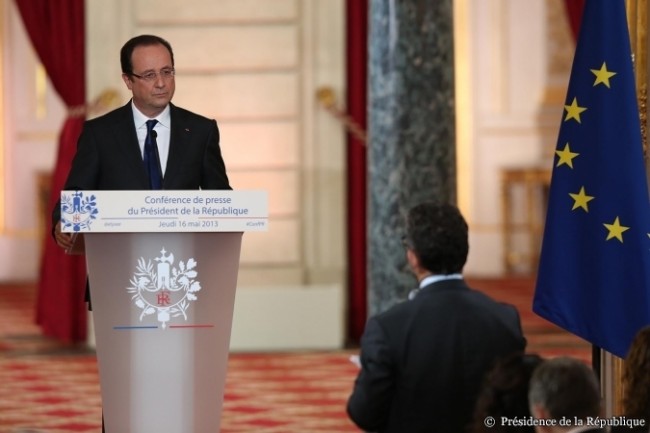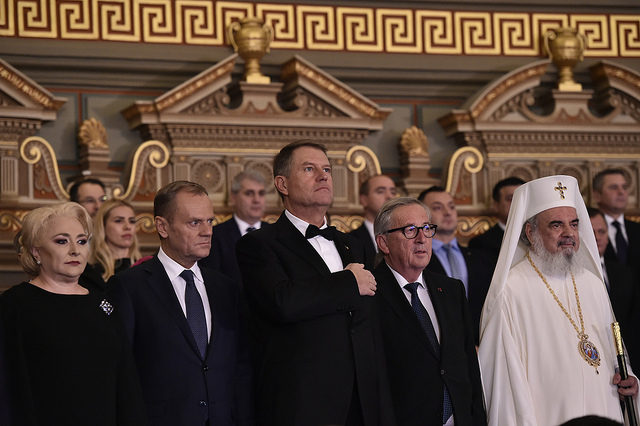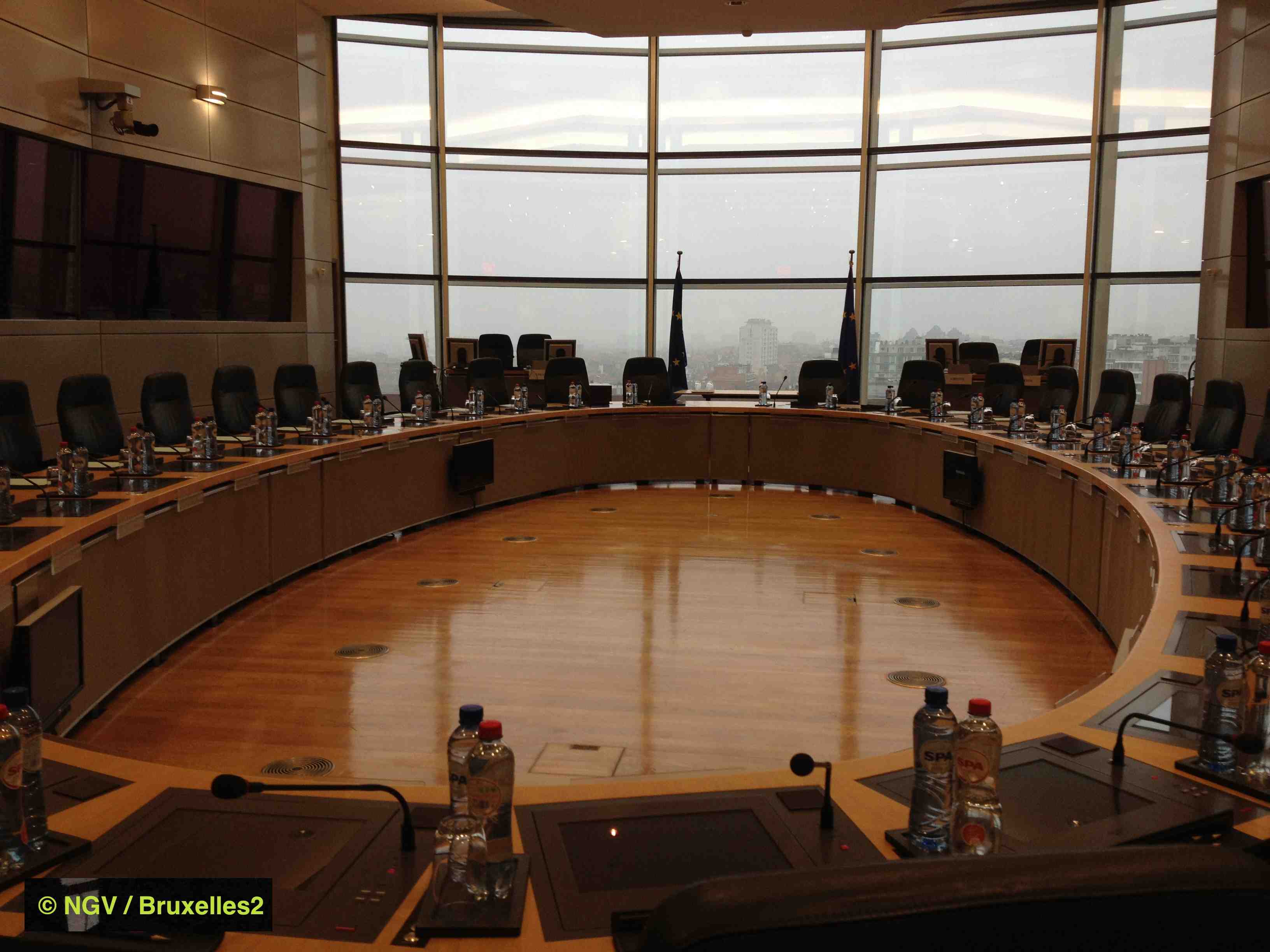Holland says “yes but” to Merkel. Its “European Initiative”. Our comments (updated)
 (BRUSSELS2) The French President presented yesterday (16 May) during a formal press conference in Paris, the desire to go on the "offensive", particularly at European level. Her " european initiative “has a goal” to get Europe out of the languor that grips it and to reduce the disaffection of the peoples which can only compromise the very future of the European Union”. I am not sure that his proposals meet all these objectives. They are not totally original and "dizzying". But they have the merit of putting the Franco-German couple back at the heart of the negotiation game.
(BRUSSELS2) The French President presented yesterday (16 May) during a formal press conference in Paris, the desire to go on the "offensive", particularly at European level. Her " european initiative “has a goal” to get Europe out of the languor that grips it and to reduce the disaffection of the peoples which can only compromise the very future of the European Union”. I am not sure that his proposals meet all these objectives. They are not totally original and "dizzying". But they have the merit of putting the Franco-German couple back at the heart of the negotiation game.
The cyclist's observation
F. Hollande thus takes up the observation of the cyclist dear to Jacques Delors - who was one of his mentors in politics - and wants to imprint a new movement. " The European idea demands movement. If Europe does not move forward, it falls or rather fades away; it is disappearing from the map of the world, it is even disappearing from the imagination of peoples. It is therefore high time to carry this new ambition.”
The elements of a new intergovernmental discussion
This initiative is based on 4 proposals: economic government and budgetary capacity for the Euro Zone, plan for young people and investment plan, European Community for energy. 4 points which are not automatically totally innovative in the French position but appear a bit like the conditions for a new European negotiation. Because, at the same time, the French president clearly said "yes" to the proposal of the German Chancellor "of a political Union". A new tone which can give, according to the classic European give-and-take strategy ('I accept what you ask for, you accept what I want'), the elements of a new intergovernmental discussion.
A political union: an old German demand
Political Union, this "new integration step", Berlin has advocated it with its wishes. For several months (several years), the main German leaders have been sermonizing it in all tones. France has so far reserved its response, contenting itself with dilatory responses. François Hollande responds today hui: chick! Let's go..."France is ready to give content to this political Union"giving oneself"two years to get there". Two years, "whatever governments are in place“he takes care to specify.
- NB: A small point intended to underline that if it is not with Merkel CDU-FDP version, that the president will negotiate, it could be with Merkel in another configuration (CDU-SPD or CDU-SPD-VERTS) or another Chancellor (SPD-GREENS). A few days before the visit of the French president to the 150th anniversary of the SPD in Lepizig, it's not entirely innocent... "It is no longer a matter of political sensitivity, it is a matter of European urgency." He added.
1° An economic government for the Euro Zone: an old French request
This "economic government" would meet, "every month", around a "real President appointed for a long term and who would be assigned to this sole task".
- NB: In October 2011, the "27" had decided to create this function but aligning it with that of the President of the European Council, same date of appointment, same term of office... Without going so far as to indicate that the people were the same, it was an implicit incitement to merge the two positions. The "budgetary" Treaty (on stability, coordination and governance within the Economic and Monetary Union) endorsed this creation by indicating a minimum of two meetings per year. The "Holland" proposal therefore assumes that this president is different from the president of the European Council, has a mandate of 5 years (and not 2 and a half years renewable once) and a more sustained frequency of meetings. This separation of the two posts would have advantages: to avoid any pre-eminence of the euro zone on the future choice of the president of the European Council or, conversely, that the euro zone “undergoes” a president “outside the euro zone. It would have a disadvantage : multiply the number of posts.Or else it would be necessary for this "president of the euro zone" to also chair the councils of ministers of the Eurogroup.
This economic government would have four functions:
- debate of the main economic policy decisions to be taken by the Member States” ;
- ' harmonises(r) taxation » ;
- start at " make an act of convergence on the social level from above” ;
- initiate a plan to combat tax evasion".
- NB: the economic government for the euro zone is a French antiphon. We remember the willingness displayed by President Sarkozy under the French EU presidency in 2008 and then. But this idea is present in the French political corpus long before. President François Mitterand had already expressed it very clearly at the opening in Rome, in 1990, of the intergovernmental conference, which should preside over the establishment of the Maastricht Treaty. " If the IGC in charge of this economic and monetary union comes to the conclusion that a currency is needed (...) it will inevitably be forced to conclude that there is a need for an economic government of Europe " he said.
2° A budget for the Euro zone
A budget capacity "would be attributed to the euro zone"and the possibility, "gradually, to raise the loan" asks F. Hollande. NB: A proposal that he classifies in his speech in 4th position. We have brought it back into the logic of economic government in 2nd position. The point is, in fact, much discussed and disputed. Berlin but other capitals were not very warm at all on this proposal, even hostile.
3° A plan for the integration of young people
The European financial framework, the European budget has already provided six billion euros for youth employment." For the President, it is necessary "mobilize immediately, even before the financial framework is in place for 2014, part of these funds so that we can come to the support of all the young people of Europe who, today, are struggling to find training or a use". In addition, Europe should define "an investment strategy, particularly for new industries and for new communication systems".
- NB: we are, here, in a fairly classic European scheme, the European Social Fund like the Lisbon strategy had already indicated as a priority the employment of young people or the new communication systems. We are simply waiting to see what this "new investment strategy" means.
4° A "European Energy Community"
This "CEA" would be intended to " coordinate all efforts for renewable energies and succeed together – while Europe has countries that do not have the same energy policies – to ensure the energy transition”.
- NB: This is a campaign promise from President Hollande. But there is a fundamental division, often killed in Brussels, on nuclear power. A point that opposes, again, Berlin and Paris. One can also only be severe. What a waste of time! Ten years ago, the ECSC, the European Coal and Steel Community, was allowed to bury itself, on the pretext that "coal is the past". And that the existing Community instruments were enough. However, the ECSC had quite innovative instruments (levies on producers, reinjection into capacities and training) that the current European instruments did not have and still do not have.
(Update) Added additional information on economic governance. And reminder of the budgetary treaty.
Download thespeech by President Hollande


